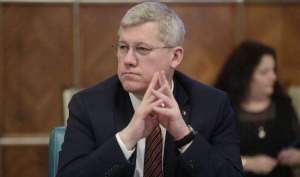Governor Mugur Isărescu had not yet responded to Traian Băsescu, yesterday by 17:30, even though yesterday, the president had explicitly and firmly asked him, in public (on B1TV), while making unprecedented accusations, that the National Bank is not only an accomplice, it is actually an initiator of the "electoral bribe" which the Ponta government is preparing - the postponing of the payment of half of the amount from the amount of loan installments repayments, for those with low incomes and those who are late with their payments; Isărescu had the opportunity to respond, just as publicly, in his speech on the conference with the topic "The creation of an international equity market in Romania" (held in the building of the NBR, where he also participated with prime-minister Victor Ponta), but did not do it.
On this occasion, Mugur Isărescu said: "From a macroeconomic point of view, the need to develop the Bucharest Stock Exchange is obvious, especially at this time, when banks are reluctant to resume lending and the financing of new projects through investments could be taken over by the stock market".
I for one, I am happy that the Governor holds this opinion, especially since it validates my own, which I launched half a year ago, at the BURSA conference dedicated to the strategy for the turnaround of the stock market (September 13th, 2013).
And it also confirms my warning that the month of March this year should have found us prepared for the stock market to take over the financing role of the banks (the Governor is a bit late with his statement, in my opinion).
But before anything else, we are waiting for the response of the National Bank of Romania to the accusations issued by Băsescu and I was afraid that Isărescu may mistake his independence for the right to become defiant.
Because I had no doubt that the National Bank of Romania was independent, until the president accused it of not being so: "I want the NBR to immediately shake of the control of a corrupt government", the president demanded.
Aha!
The president had embroiled the Governor in an impossible situation, which Isărescu couldn't escape of by keeping silent, under the pretense of being independent; because if he didn't answer, it would confirm that he did participate in the drafting of the "electoral bribe" offered by the Ponta government (in fact, Ponta yesterday thanked the Governor for his cooperation).
Thus, by not responding to the president, the Governor would not be demonstrate his independence, he would actually be defying him politically.
Ha! ha! - I've never seen someone's silence be so eloquent, in the field of Romanian politics, ever!
A silence that says a lot.
You may think that this is the speculation of a journalist obsessed with logical nitpicking and "scenarios".
No.
I have the proof that Isărescu is thinking precisely of what I'm thinking:
"We also need to consider that we are in an electoral year, and politicization can occur very quickly", Mugur Isărescu said yesterday at the NBR conference of the NBR, instead of giving the response he had been asked for, and he went on to say the following: "The measures which we are implementing here have to be explained again and again. There is the risk of them being interpreted politically and then would be turned on their head".
There was a specific context that Isărescu formulated this.
But it is his only expression, in yesterday's conference, alluding to what Băsescu did.
He is not responding, but he is describing the situation as "politicization".
This is sort of an attempt to abstract from the problem, like Adrian Vasilescu, the spokesperson of the NBR does - who is an "independent journalist" in his spare time, whose editorials get published in the printed press, who is never in a conflict of interest (a model for the insignificant disciples, starting off with Radu Soviani from the ASF and following through with the other journalists of Money Channel, who keep lining up to become spokespersons).
It could have been an honorable attempt, if Traian Băsescu hadn't already anticipated, as he had made the following statement a day before: "I don't want to see the oily spokesperson of the NBR act as if".
Checkmate.
The governor kept his mouth shut, upon seeing that he was going into checkmate.
So, sometime around 17:30, he broke the silence with a press release in which he outright denies that the NBR is the creator of the "electoral bribe" project.
I breathed a sigh of relief.
The NBR implies that the information of the president is false.
It feels a lot better to tell the president he's speaking nonsense rather than not respond to him at all.
It's funny!
It's so funny, that I am tempted to end the article right here.
But the article is only just beginning - what I wrote so far is just the intro to the real problem: "the electoral bribe".
• Lenin and his platinum frame
In the times of Ceauşescu there was a joke which said that a Jew called Yitzhak emigrated to Israel, from the Soviet Union and in order to take his wealth with him, he spent everything he had on acquiring a platinum frame, which he used for the portrait of Lenin; when he was asked on the Soviet side of the border about the platinum frame, he said he was carrying the portrait of Lenin with him, and when he was questioned about Lenin's portrait by the Israelis, he told them that he was carrying a platinum frame, not the portrait of Lenin.
That's basically how things are with the "electoral bribe" (the government aid for those who have low income and outstanding loan payments) it's the platinum frame for Isărescu (support for the banking system) and the portrait of Lenin for Ponta (electoral aid).
If you combine Isărescu and Ponta, you get Yitzhak.
While we can't expect much from prime-minister Victor Ponta, because the man is known for only pursuing his own political interest, in the case of Governor Mugur Isărescu things are more complicated.
Perhaps, at first glance, helping the banking system, which Isărescu is promoting, is not a political gesture, but one that falls within the duties of the Central Bank.
But those duties should also be interpreted in context, not just blindly.
The entire European banking is being devoured by the financial crisis, despite the tepid optimism of the authorities of the United Europe (the passing of the "bail-in" measures - the possibility of the seizure of the depositors' money, accepted as a legal measure by the European Banking Union, illustrates the desperation of the situation of the banking system -, and the proposal of the Bundesbank to enact a "wealth tax" illustrates the desperate state of the budget of the EU).
In this context, the Romanian banks present three characteristics:
1. The Romanian banking system seems more resilient for the moment to the crisis, (it is not showing any need for a bailout as seen in other EU countries, nor its number of defaults);
2. The equity of banks in the Romanian system is overwhelmingly owned by foreigners (over 90%);
3. Romania is not a member of the Banking Union, so the "bail-in" operation is not legal in Romania, meaning that the depositors are not threatened by the peril of their savings being seized (although that doesn't mean at all that it won't eventually happen).
The measures of support for the Romanian banking system are preventative and of public utility, in light of their first feature.
But if these measures lead to the population being forced to take money out of its pockets - which is basically what the "electoral bribe" does, exempting from taxes those who received help with their loan payments - then what we are dealing with is a local version of the "bail-out" (to which the EU also added the "bail-in", as an intermediate measure).
That also means that the first characteristic is just superficial and depends on appearances - and therefore, the "electoral bribe" is not just preventive, it is also necessary.
In light of the second characteristic, we notice that this kind of a national "bail-out" leads to importing the crisis, through the banking foreign capital, which resorts to domestic revenues to save itself.
More explicitly: Isărescu and Ponta, through the "installment bribe, are promoting the spoliation of the population, in favor of the foreign equity (is this what the Governor was speaking about when he advised yesterday, not making the distinction between foreign and domestic investors?).
And finally, when it comes to the third characteristic, I have to remind that Traian Băsescu announced this year that in March-April, Romania will join the Banking Union.
In other words, the "bail-in" will become applicable and we will live in fear that our businesses will be destroyed, through the seizure of money from our bank accounts, where we are required by law to keep them in.
In other words, between Traian Băsescu, Mugur Isărescu and Victor Ponta there is no disagreement whatsoever; they are all OK with the population and Romanian businesses paying their dues when it comes to the continental crisis.
All three of them are in agreement.
All of them are OK with us being fleeced.
So then why are they arguing?!
Well, it's all just for show.
• Boc: "I hope that the NBR will not become once again a part of the electoral debauchery financed by public spending"
Former prime-minister Emil Boc hopes that the NBR will not once again become part of the electoral debauchery financed by public spending, according to Mediafax. He said yesterday: "I am negatively surprised to hear the NBR sliding down the populism ramp, when it was one of the most consistent supporters of the measures to reform the state and to restore the budget balance. I hope that it won't be true, because the NBR was one of the pillars, together with the Government and the president, with which we restored the macroeconomic budget balance which was destroyed between 2007-2008. I hope the NBR will not become once again a part of the electoral debauchery financed by public spending. Between 2009 and 2012, the NBR was a pillar and a supporter of the measures to restore macroeconomic budget balance. At the time, the government took steps which helped restore the budget balance, and the current account deficit has been reduced and for the first time Romania had the chance of joining the Eurozone in 2015".
• A press release of the NBR
"The plan of the scheme to stimulate consumption through fiscal measures (which would facilitate a rescheduling over the next two years of the payments on the loans taken out by people with revenues below the average net wage) did not involve and will not involve, from the National Bank of Romania, any decision pertaining to the monetary or banking policies.
The scheme in question relies on fiscal measures, as it has been conceived, initiated and developed by the delegated minister for the budget, Mr. Liviu Voinea. It is revealing that the entire motivation of this measure was the object of an article which was recently published on the Financial Times website under the signature of Mr. Voinea. The National Bank of Romania was consulted in this project before and during the negotiations with the IMF, the European Commission and the World Bank. One team of the NBR which was qualified for the topic, consisting of experts of the supervision, bank regulation, financial stability and legal departments, participated in the talks with the team of the Ministry of Finance, the IMF, the European Commission and the World Bank, supplying statistical data and making assessments. The elements which the NBR experts considered essential (specifically the voluntary nature of the fiscal scheme and the individual negotiation by the debtors with the commercial banks) are featured in the current version of the draft. The cooperation between the National Bank of Romania and the Ministry of Finance is ongoing, and is more intense during the periods of negotiation with the international institutions, and is based on the Romanian laws, European regulations and international good practices. Given this legal context, in January this year and the consultations on the issue of the aforementioned fiscal scheme, as well as those concerning the issue of the bonds of the Romanian government on the domestic and international markets".



























































